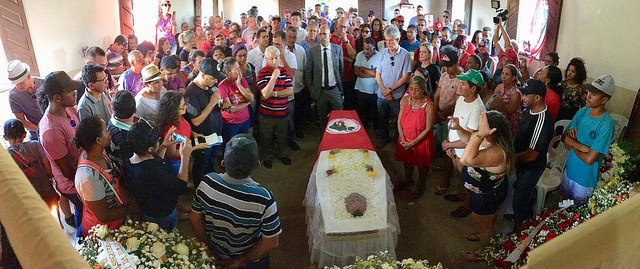Two MST workers killed in Paraíba, northeast Brazil

Ler em português | Leer en español
Two activists of the Landless Workers’ Movement (MST), José Bernardo da Silva, known as Orlando, and Rodrigo Celestino, were killed in Brazil’s northeast state of Paraíba on Saturday night, around 7 p.m.
The landless workers were having dinner at the Dom José Maria Pires camp, in the city of Alhandra, when four heavily armed men broke into the area and shot them dead.
The Dom José Maria Pires camp, old Garapu Farm, belongs to the Santa Tereza Group and has been resisting for more than one year. “We will attend the funeral and hold a political rally,” congresswoman-elect Cida Ramos wrote in a statement.
The MST in Paraíba also released a statement. “We demand justice and the punishment of the guilty, and we believe fighting is not a crime,” the statement reads.
The landless organization also wrote that, “in these times of distress and doubts about Brazil’s future, we cannot let those with political and economic power decide our fate. So we continue to reiterate the struggle in defense of land as a central matter to guarantee workers’ dignity in rural and urban areas.”
Three branches of the Public Prosecutor’s Office released a statement expressing their solidarity with the activists’ families, reiterating their “commitment to protecting the human rights of settled families and to concerting efforts with investigation bodies to clarify who the perpetrators of the double homicide are and to have them punished according to the law.” The statement was signed by the Federal Attorney General, Raquel Dodge, the Federal Attorney General for Citizens’ Rights, Deborah Duprat, and the Regional Attorney General for Citizens’ Rights, José Godoy.
Paraíba: struggles and conflicts
The struggle for land in Paraíba is not new. The Peasant Leagues, one of the most important movements fighting for land reform in the country, was very strong in the state between the 1950s and 1960s. Conflicts are faced in the state to this day.
Marco Antonio Mitidiero Júnior, a professor and researcher investigating land issues, recalls the state’s history, arguing the most violent conflicts happen in the Zona da Mata and Brejo Paraibano areas – Alhandra, where the activists were killed last Saturday, is located in the former, an area the professor said is marked by rural violence.
The Workers’ Party congressman and priest Luiz Couto, for example, has been living under police for more than ten years, after exposing the action of hitmen in the area.
“It’s a violent area that is very coveted because of sugarcane and limestone ore [production],” Mitidiero says.
The professor points out, however, that the number of killings in the area dropped in recent years. The latest killing before last Saturday’s crime happened in 2016, when the settled farmer Ivanildo Francisco da Silva was shot dead inside his own home. He was the chair of the local Workers’ Party office and a supporter of the Pastoral Land Commission.
According to Mitidiero and the National Pastoral Land Commission’s database, 31 people were killed in the area for defending rural workers’ rights between 1962 and 2018.
*With reports by Daniela Stefano
Edition: Heloisa de Sousa and Luiz Felipe Albuquerque | Photo: Christian Woa | Brasil de Fato
